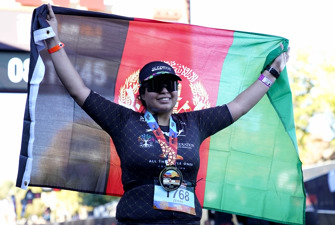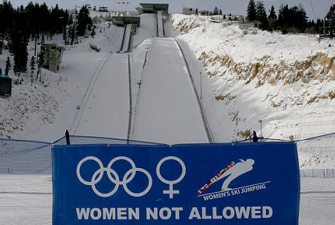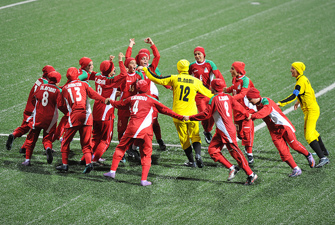Practical suggestions on how sports federations can be fair to transgender athletes
OPINION: Sports federations should take an ethical approach on how to include transgender athletes. Andy Harvey suggests developing benchmarks for tolerable unfairness and baselines for acceptable safety risks as a way to determine if transgender athletes should be included or not.
Andy Harvey is Chair of Gamechanger360 and a former full-time lecturer at Swansea University. He is writing in his personal capacity.
Opinions on playthegame.org reflect the views of the author(s).
Transgender inclusion in sport is one of the more difficult issues facing international federations and national sports governing bodies. How transgender athletes can participate and compete in sports has become a vocal feature of the ‘culture wars’ that have ignited in many Western countries and elsewhere.
Recently, I have participated in two conferences and one expert meeting on the topic and am convinced that sport's rule makers need some assistance in working out how best to include trans athletes in their sports. This article sets out a brief guide to some of the relevant matters they should take into account when developing policy.
1-3 per cent of the population do not fit into traditional sex/gender categories
The need for policy arises from the empirical fact that many sports are organised into sex categories in a way that would be almost certainly illegal in other sectors of the economy in many countries.
There are good reasons why some sports are organised along separate sex/gender lines: as a population, men enjoy a physiological advantage over women for those sports that rely on strength, speed and power that would make mixed gender competitions untenable and unfair. Enabling women to compete against each other, rather than against men, leads to contests of greater fairness where participants have a chance of winning if they are good enough.
Sex segregation has proven to be a powerful tool to expand participation in sports to include girls and women. However, the problem is that the world is not neatly divided up into binary categories of sex.
A small but significant part of the population challenge the binary classification. There are those people who are born with natural variations of sex characteristics that mean that they cannot be categorised unproblematically as male or female. Caster Semenya is perhaps the best-known athlete in this respect and her story is still unfolding in the European Court of Human Rights.
According to esteemed feminist biologist, Anne Fausto-Sterling, there are over 40 medical categories for the way that differences in sex anatomy may develop and it is estimated that between 0.5 and 1.9 per cent of the population are born or develop so-called ‘intersex’ characteristics.
In addition, there are transgender people who do not identify with the sex to which they have been assigned. In the UK’s 2021 national census, 0.5 per cent of the those responding to a voluntary question on gender, identified as transgender.
As these figures indicate, the assumption of binary sex upon which many sports are organised is undermined by the existence of at least 1 - 3 per cent of the population who don’t fit into those categories.
South African runner Caster Semenya is currently having her case heard by the European Court of Human Rights. Photo: Cameron Spencer / Getty Images
There is very little robust scientific data on sports performance to base policy on
How might athletes who do not fit neatly into the binary sex/gender system be included in sports in ways that respects the integrity of those sports and, especially, the needs of women athletes for fair competition?
In the past two years, several international federations, including World Aquatics, Union Cycliste Internationale, and World Athletics, have tightened their eligibility criteria to effectively prevent trans women from competing in the female category of their sport.
Very often, these international federations justify their policy by an appeal to ‘the science’, which, they claim, show that trans women retain a physiological advantage over cisgender women even after a number of years of gender affirming hormone treatment.
However, according to a scientific review from the Canadian Centre for Ethics in Sport the number of such studies remains low, they show variable results, do not use comparable study groups, and often fail to take into account characteristics such as height. We do not have any studies that follow a cohort of transgender athletes through their gender transition journey and compare their sporting performance against a cohort of similar-bodied cisgender athletes.
Instead, alleged sporting advantages are extrapolated from laboratory tests on measures such as handgrip strength and lean muscle mass. Crucially, there are no studies that show any advantage in any actual sport.
This is reflected in the real world where participation rates of trans athletes amount to a tiny percentage compared to the prevalence of trans people in society. The sports researcher, Madeleine Pape, has calculated that, at the Olympic level, trans participation is less than 0.02 per cent. If we compare that to a known prevalence rate in society of at least 0.5 per cent we can see that trans athletes are under-represented at the elite level.
At the recreational level, dozens of sociological studies dating back to the 1980s show that gender and sexual minorities are systematically excluded from sport and often discriminated against in sport.
The real problem is not that trans athletes will dominate sports, but that they are being systematically excluded from sports, thus contributing to the high levels of discrimination faced by trans people in society as well as the negative health effects caused by exclusion from physical activity opportunities.
It would be beneficial, if governing bodies stopped presenting science as a set of facts upon which everyone agrees but recognised, as the IOC does, that on this issue the scientific data is in its infancy and subject to significant degrees of interpretation.
In fact, reputable scientists are unable to agree on what the science says. The recent debate in the academic literature over the validity and reliability of numerous studies on transgender athletes should act as a reminder to sport's rule makers that there is no single scientific consensus and there is unlikely to be one any time soon given the difficulties in conducting rigorous research in this field.
It would be better for governing bodies to acknowledge the uncertain quality of the evidence base, to respect the differences in interpretation among the experts, and to make it clear that they have to take a balanced approach to policy-making rather than relying on one interpretation over another. Policy should also be reviewed on an annual basis to take account of any developments in the scientific field.
Inclusion should be the starting point
In the meantime, and in the absence of firm and consistent data in respect of sports performance, how should international federations and sports governing bodies proceed? A good starting point might be principle 4 of Olympism in the Olympic Charter which states that, ‘the practice of sport is a human right. Every individual must have the possibility of practising sport, without discrimination of any kind’.
In November 2021, the IOC published new guidelines on inclusion in sport that gave significant support to this ideal. Like all human rights, it should apply universally, but also with a recognition that it does not confer an absolute right. There will always be criteria of performance ability that will restrict the right to participate to those levels that are appropriate to the individual athlete: we cannot all compete at the Olympic Games!
However, the principle should be the foundation upon which policy is built and might be rephrased in the following terms: in the absence of a compelling reason to exclude transgender athletes, there should be an assumption of inclusion based on gender self-identity.
Such an approach would also be in line with those countries, such as the UK and Australia, that have national laws protecting transgender people from discrimination while also allowing sports bodies an exception solely on the grounds of sporting fairness and safety in sports where physicality is strongly predictive of sporting success.
Define benchmarks for tolerable unfairness
Fairness in sport is a slippery concept since sport is an inherently unfair activity. The purpose of sport is very often to confer honours upon those people who have been blessed with abilities denied to the majority. Nevertheless, fairness of competition appears to be a prerequisite for a sporting contest worthy of its name.
Of course, that begs the question as to what is meant by fairness. I would suggest that a working axiom for elite sports might involve a three-part question. Firstly, what are the parameters of unfairness that our sport usually allow as being tolerable? Secondly, does research show that transgender athletes breach those parameters? Thirdly, is the breach due to being transgender rather than some other non-gender related reason?
If the answer to the second and third questions is that transgender athletes do enjoy an unfair advantage, the federation is entitled to introduce eligibility criteria that would bring any advantage down to within the tolerable parameters of unfairness as set out in the first question.
For example, in the Tokyo 2021 Women’s 100 metre final, there was a difference of 0.51 seconds between the winner and the last placed athlete and a gap of 0.13 seconds between gold and silver medallists. These differences might act as a benchmark for tolerable unfairness in 100 metre women’s races.
It would then be an easy task for statisticians to use multiple race times to produce more accurate figures for the normal differences in race times between competitors This would provide a benchmark of parameters that is normally regarded as acceptable within the limits of tolerable unfairness. Only if trans women, taken as a group, exceed the parameters can it be regarded as unfair. As it is, no trans woman runner has ever competed in the Olympic Games, let alone come home with the gold medal.
The advantage of this approach is that it is empirically based, judged on actual performance times/records etc., rather than laboratory tests, which may not be relevant to sporting ability. The principles can be used to assess any situation where there might be a category advantage that may be enjoyed by a particular group of athletes. In other words, it is an inclusive system that gives effect to the right to participate in elite sport while balancing the needs of other athletes.
World Rugby has banned trans women from playing women's rugby with safety risks as the main reason. Photo: simonkr / Getty Images
Discriminatory to exclude trans women over safety concerns
Some federations have used the issue of safety as an argument for excluding trans women, like World Rugby that has made alleged safety risks the primary reason for banning trans women from playing women’s rugby, despite there being little empirical evidence that trans women do in fact pose such a risk.
In a policy that is informed more by ideology than by any evidence of injuries caused in play, World Rugby issued guidelines in 2021 that banned trans women from playing in the women’s game, and the federation maintained that they were doing so out of a primary concern for safety in the game. Yet this claim does not stand up to close scrutiny.
For example, on the issue of safety, it might be noted, that nearly 300 former male players are suing World Rugby for failing to put reasonable measures in place to protect the health and safety of players. Tragically, in March 2024, former New Zealand rugby player Billy Guyton was deemed to have died from chronic traumatic encephalopathy (CTE) almost certainly as a result of injuries sustained while playing rugby.
A reasonable person might think that World Rugby needs to first get its house in order in the men’s game, where there is overwhelming evidence of head and brain injuries, before banning trans women on the basis of purely theoretical risks.
One of the main principles of inclusive policy-making is that the same rules should apply to everyone equally and no particular group should be singled out. World Rugby, and those national governing bodies that have followed their lead, have failed to grasp this important point.
In short, the World Rugby guidelines discriminate against trans women since they do not apply the same principles to all other participants. Such discrimination is likely to be unlawful in those countries where transgender identity is a protected characteristic in equality legislation.
Find a baseline for acceptable levels of risk
So how might better policymaking be developed that gives effect to sports' responsibility to protect the health, safety and well-being of participants? Each sport will be different, and many sports have very few inherent safety risks, but for those that do, the following principles might assist.
Firstly, what level of risk is regarded as acceptable and consented to by players who participate in the sport? Secondly, do transgender players pose a risk that is greater than one which is usually accepted and consented to? Thirdly, is this greater risk due to being transgender rather than to other non-gender related attributes?
If the answer, based on evidence, is that transgender athletes do pose risks that lie outside those that are usually accepted and consented to, then the governing body should introduce eligibility criteria that brings the risks down to acceptable limits.
Once again, these are empirical questions that can be assessed on an ongoing basis. It might be noted, in passing, that one of the most serious recent injuries in British women’s rugby which left a player paralysed was caused by a cisgender opponent.
One lesson from this regrettable case is that safety is a universal concern, and rules and practices need to apply universally rather than aimed at one particular group. A further message for the rugby authorities might be that it needs to make the game much safer across the board to reduce risks to all players.
Develop policy on eligibility criteria based on performance abilities
To conclude, international federations and national sports governing bodies can take some of the heat out of the debate about transgender inclusion in sport by taking a balanced view about the scientific evidence and recognising that the science is in its infancy and subject to disagreements and interpretation.
In the meantime, they can balance the requirements of inclusion, fairness and safety by following the lead of national laws where inclusion is the default position but with exceptions made for fairness and safety when there is empirical evidence to support relevant eligibility criteria.
Once they set eligibility criteria all participants that meet the criteria must be allowed to participate with reviews of the criteria held at yearly intervals, or more often if significant new evidence comes to light from actual sporting contests. By developing policy based on ethical principles of inclusion and regularly reviewing eligibility criteria based on evidence of performance abilities, sports can ensure fair and safe competition while giving effect to the ambition set out in the Olympic Charter to enable participation in sport as a human right.
Andy Harvey is Chair of Gamechanger360 and a former full-time lecturer at Swansea University. He is writing in his personal capacity.
Comments on playthegame.org reflect the views of the authors and not necessarily those of Play the Game.







